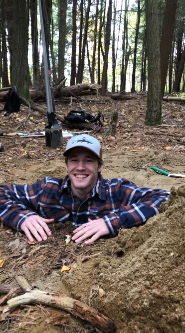Live Poster Session: Zoom Link
Thursday, July 30th 1:15-2:30pm EDT
Abstract: Bernays and Graham proposed the “Enemy-Free Space” hypothesis in the paper “On the Evolution of Host Specificity in Phytophagous Arthropods” in 1988. They hypothesized that traits associated with dietary specialization would allow herbivores to better escape generalist enemies, and thus generalist enemies would select for a narrower herbivore diet breadth and dietary specialist herbivores would experience less predation and/or parasitism than dietary generalist herbivores. We performed a literature review to analyze the evidence related to the hypothesis and the herbivore traits that act as mechanisms of selection for dietary specialization. We focused particularly on four herbivore traits: the ability to sequester plant chemicals; faster growth due to better perceptual judgement; camouflage; and the ability to suppress plant volatiles. We found support that specialist herbivores sequester plant chemicals more often and utilize them for their own antipredator defenses more effectively than generalist counter parts. We also found that generalist herbivores are more likely to face issues concerning perception and decision making when faced with multiple sensory inputs, leading to longer larval growth times and more time in a very vulnerable life stage. Specialist herbivores are also more effective at employing camouflage tactics, and a negative association was found between camouflage and other defensive movements. The fourth herbivore trait, the suppression of plant emitted volatile compounds, found little support in the literature and there were more studies indicating no relationship between dietary specialization and ability to suppress induced plant volatiles. From our literature search we found overall support for the hypothesis as many specialist herbivores had more effective antipredator traits and lower mortality from generalist predators when quantitatively measured. The wide breadth of our research showed that the selection pressure can be dependent on the type of natural enemy and some traits can result in trade-offs between protection from one kind of enemy and susceptibility to another.
Singer-Lab-Summer-2020-PosterLive Poster Session: Zoom Link
Thursday, July 30th 1:15-2:30pm EDT







very interesting!